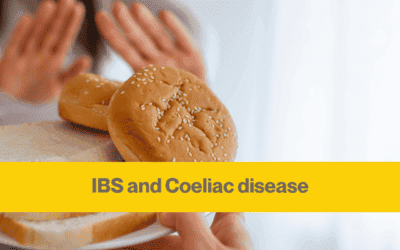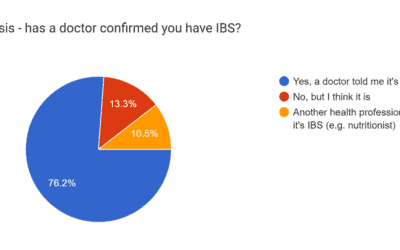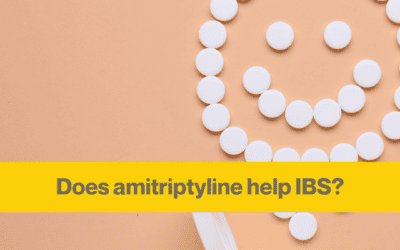Do you love a morning coffee? Most people do, but is coffee bad for IBS? And the impact it has on our gut.
I’m Anna Mapson, a registered nutritional therapist and I help people who’ve got IBS to navigate all the information out there and find a good diet that works for them.
How does coffee affect IBS?
Most people know already that when you drink coffee it can speed up your bowels, it can speed up the rate of transit of food through your bowels, stimulating the nerves in your digestive system, and basically causes you to have a bowel movement.
One study found that individuals drinking coffee weekly or more had greater odds of IBS than those who never drank coffee. In addition, people who drank the most coffee (more than 106.5 mg of caffeine per day) had 47% greater odds of IBS compared to those who drank the least (<69.4 mg per day).
There are 3 areas I want to cover when it comes to coffee and IBS…

Coffee is a gut stimulant, not so good for diarrhoea
First of all, if you’re prone to diarrhoea and frequent trips to the bathroom, coffee may worsen your symptoms. One study showed the urgency for a bowel movement was evident within four minutes in healthy people (without IBS).
The mechanism for this isn’t quite clear as the liquid probably hasn’t hit the colon within four minutes, but we do know that coffee stimulates the gastrocolic reflex, and that can trigger the rush to the loo.
But in contrast, if you have constipation and you struggle to open your bowels regularly then coffee can be quite a good trigger for you just to get things moving, so depending on your symptoms coffee may or may not be useful for you.
Coffee may increase stomach acid
Secondly, coffee can increase the amount of stomach acid that we produce, so if you are someone who frequently has acid reflux, then maybe thinking about cutting down on your coffee intake can help because it can actually be stimulating the production of more acid.
Coffee stimulates the production of gastrin and promotes the stomach cells to produce more acid. It doesn’t necessarily relax the sphincter at the top of the stomach to let more acid into the oesophagus, but the excess acid may be noticeable if you get frequent acid reflux.

Coffee could reduce sleep, which is bad for IBS
The third thing, again, most people know is there is a big impact between the gut and the brain.
Coffee increases the amount of cortisol in our body, that’s why we drink it in the morning to help us wake up. We use coffee to stimulate our nervous system to get us going. However if you’re someone whose IBS overlaps with an anxiety condition (or any kind of other mood disorder where you feel a lot of anxiety and you experience being on edge), or maybe have trouble sleeping, then coffee might not be such a good idea for you.
It can very much depend on how quickly your liver enzymes work as to how long it takes you to process the caffeine. Some people will be completely fine drinking it late in the afternoon and still going to sleep. Other people may struggle with the wakeful effects from a morning cup.
Caffeinated drinks can worsen sleep quality
Generally having one to two cups of coffee in the first half of the day should be okay.
This may not be affecting your sleep, but do think about the timing of your coffee intake. Try to reduce caffeinated drinks or have them earlier in the day.
You may fall asleep just fine, but caffeine can reduce the quality of your sleep throughout the night or wake you up earlier in the morning. Try having your coffee before lunchtime if possible, then try to have a caffeine-free afternoon and evening to help improve your sleep.
If you want to read more about sleep and gut health I’ve written about this before.
Are there benefits to drinking coffee?
Coffee seems to be associated with longer life. In fact a coffee meta-analysis paper from 2021 showed that people who drank up to 3 cups of coffee a day had a 13% less chance of dying, compared to people who didn’t drink coffee.
It’s possible some of the benefits of regularly drinking coffee are related to the way the gut microbes
Coffee could feed your beneficial gut bacteria
You might be surprised to learn coffee contains significant amounts of soluble fibre. This fibre, mainly galactomannans and arabinogalactan-proteins, can be used by our gut microbes in the large intestine as fuel. A cup of brewed coffee might contain around 1g fibre.
There are also potential benefits of phenolic compounds (chlorogenic acids) which are like antioxidants, helping to reduce oxidative stress.
Some studies have found that drinking coffee can increase beneficial bacterial species Bifidobacterium. In a 3 week trial individuals drinking 3 cups of coffee a day had increased levels of Bifidobacterium spp.
Is coffee a terrible idea with IBS?
With most things to do with IBS, it very much depends on your symptoms, your existing diet, and lifestyle factors like exercise, stress and sleep.
I hope this information has given you a little insight as to whether coffee is good or bad for you. As with most things in nutrition, it’s rarely black and white.

IBS Nutritionist
Hi, I'm Anna Mapson, registered Nutritional Therapist.
I help people with IBS and SIBO get control of unpredictable gut symptoms to find long term relief from painful and embarrassing IBS without restrictive dieting.
I can help you to:
- understand your digestion better, so you recognise your triggers
- eat a well balanced diet, with tasty meals that are simple to prepare
- reintroduce your trigger foods so you can get back to enjoying food again
Find more about my 3 month 1:1 Gut Reset programme.
IBS and Coeliac Disease: A guide to understanding & diagnosis
Are you confused about IBS and coeliac disease? Maybe you feel better without gluten in your diet, but you're not sure whether you've been tested for coeliac disease or not. The cross over between IBS and coeliac disease Coeliac disease is an autoimmune condition...
The impact of IBS on daily life
The struggles of IBS: A new survey reveals the profound impact on daily life. I ran a survey with my audience about the impact of IBS, and the way Irritable Bowel Syndrome (IBS) affects your day-to-day lives is really clear. I already knew from my work with clients...
Taking amitriptyline for IBS
Have you been offered a low dose of amitriptyline for IBS? It's an antidepressant that's sometimes offered to patients who experience significant abdominal pain related to digestion. If you're unsure about taking medication for your IBS, you're not alone. I hear this...





I suffered from ibsd for several years and found no relief other than imodium. Four months ago I gave up caffeine in coffee and tea. Since then I have not taken imodium at all and had only two minor episodes.